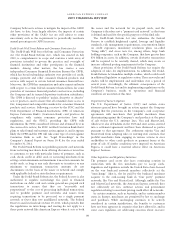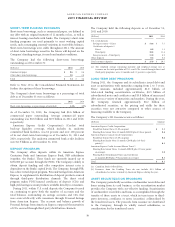American Express 2011 Annual Report Download - page 28
Download and view the complete annual report
Please find page 28 of the 2011 American Express annual report below. You can navigate through the pages in the report by either clicking on the pages listed below, or by using the keyword search tool below to find specific information within the annual report.AMERICAN EXPRESS COMPANY
2011 FINANCIAL REVIEW
Company believes its actions to mitigate the impact of the CARD
Act have, to date, been largely effective, the impacts of certain
other provisions of the CARD Act are still subject to some
uncertainty such as the requirement to periodically reevaluate
annual percentage rate (APR) increases.
Dodd-Frank Wall Street Reform and Consumer Protection Act
The Dodd-Frank Wall Street Reform and Consumer Protection
Act (the Dodd-Frank Reform Act), which was enacted in July
2010, is comprehensive in scope and contains a wide array of
provisions intended to govern the practices and oversight of
financial institutions and other participants in the financial
markets. Among other matters, the law creates a new
independent Consumer Financial Protection Bureau (the CFPB),
which has broad rulemaking authority over providers of credit,
savings, payment and other consumer financial products and
services with respect to certain federal consumer financial laws.
Moreover, the CFPB has examination and enforcement authority
with respect to certain federal consumer financial laws for some
providers of consumer financial products and services, including
the Company and its insured depository institution subsidiaries.
The CFPB is directed to prohibit “unfair, deceptive or abusive”
acts or practices, and to ensure that all consumers have access to
fair, transparent and competitive markets for consumer financial
products and services. Following a review by the FDIC and the
Utah Department of Financial Institutions (DFI) of American
Express Centurion Bank’s (Centurion Bank) card practices for
compliance with certain consumer protection laws and
regulations, and the FDIC’s providing the CFPB with
information the FDIC considered relevant and obtained by it in
the course of its review, the FDIC notified Centurion Bank that it
plans to take formal enforcement action against it, and it appears
likely the CFPB and the DFI will take some type of action against
Centurion Bank as well. See “Legal Proceedings” in the
Company’s Annual Report on Form 10-K for the year ended
December 31, 2011.
The Dodd-Frank Reform Act prohibits payment card networks
from restricting merchants from offering discounts or incentives
to customers to pay with particular forms of payment, such as
cash, check, credit or debit card, or restricting merchants from
setting certain minimum and maximum transaction amounts for
credit cards, as long as any such discounts or incentives or any
minimum or maximum transaction amounts do not
discriminate on the basis of the issuer or network and comply
with applicable federal or state disclosure requirements.
Under the Dodd-Frank Reform Act, the Federal Reserve is also
authorized to regulate interchange fees paid to financial
institutions on debit card and certain general-use prepaid card
transactions to ensure that they are “reasonable and
proportional” to the cost of processing individual transactions,
and to prohibit payment card networks and issuers from
requiring transactions to be processed on a single payment
network or fewer than two unaffiliated networks. The Federal
Reserve issued its final rule on June 29, 2011, which provides that
the regulations on interchange and routing do not apply to a
three-party network like American Express when it acts as both
the issuer and the network for its prepaid cards, and the
Company is therefore not a “payment card network” as that term
is defined and used for the specific purposes of this final rule.
The Dodd-Frank Reform Act also authorizes the Federal
Reserve to establish heightened capital, leverage and liquidity
standards, risk management requirements, concentration limits
on credit exposures, mandatory resolution plans (so-called
“living wills”) and stress tests for, among others, large bank
holding companies, such as the Company, that have greater than
$50 billion in assets. In addition, certain derivative transactions
will be required to be centrally cleared, which may create or
increase collateral posting requirements for the Company.
Many provisions of the Dodd-Frank Reform Act require the
adoption of rules for implementation. In addition, the Dodd-
Frank Reform Act mandates multiple studies, which could result
in additional legislative or regulatory action. These new rules and
studies will be implemented and undertaken over a period of
several years. Accordingly, the ultimate consequences of the
Dodd-Frank Reform Act and its implementing regulations on the
Company’s business, results of operations and financial
condition are uncertain at this time.
Department of Justice Litigation
The U.S. Department of Justice (DOJ) and certain states
attorneys general have brought an action against the Company
alleging that the provisions in the Company’s card acceptance
agreements with merchants that prohibit merchants from
discriminating against the Company’s card products at the point
of sale violate the U.S. antitrust laws. Visa and MasterCard,
which were also defendants in the DOJ and state action, entered
into a settlement agreement and have been dismissed as parties
pursuant to that agreement. The settlement enjoins Visa and
MasterCard from adopting rules or entering into contracts that
prohibit merchants from engaging in various actions to steer
cardholders to other cards products or payment forms at the
point of sale. If similar conditions were imposed on American
Express, it could have a material adverse effect on American
Express’ business.
Other Legislative and Regulatory Initiatives
The payment card sector also faces continuing scrutiny in
connection with the fees merchants pay to accept cards.
Regulators and legislators outside the United States have focused
on the way bankcard network members collectively set the
“interchange” (that is, the fee paid by the bankcard merchant
acquirer to the card-issuing bank in “four party” payment
networks, like Visa and MasterCard). Although, unlike the Visa
and MasterCard networks, the American Express network does
not collectively set fees, antitrust actions and government
regulation relating to merchant pricing could affect all networks.
In certain countries, such as Australia, and in certain member
states in Europe, merchants are permitted by law to surcharge
card purchases. While surcharging continues to be actively
considered in certain jurisdictions, the benefits to customers
have not been apparent in countries that have allowed it, and in
some cases regulators are addressing concerns about excessive
26
























